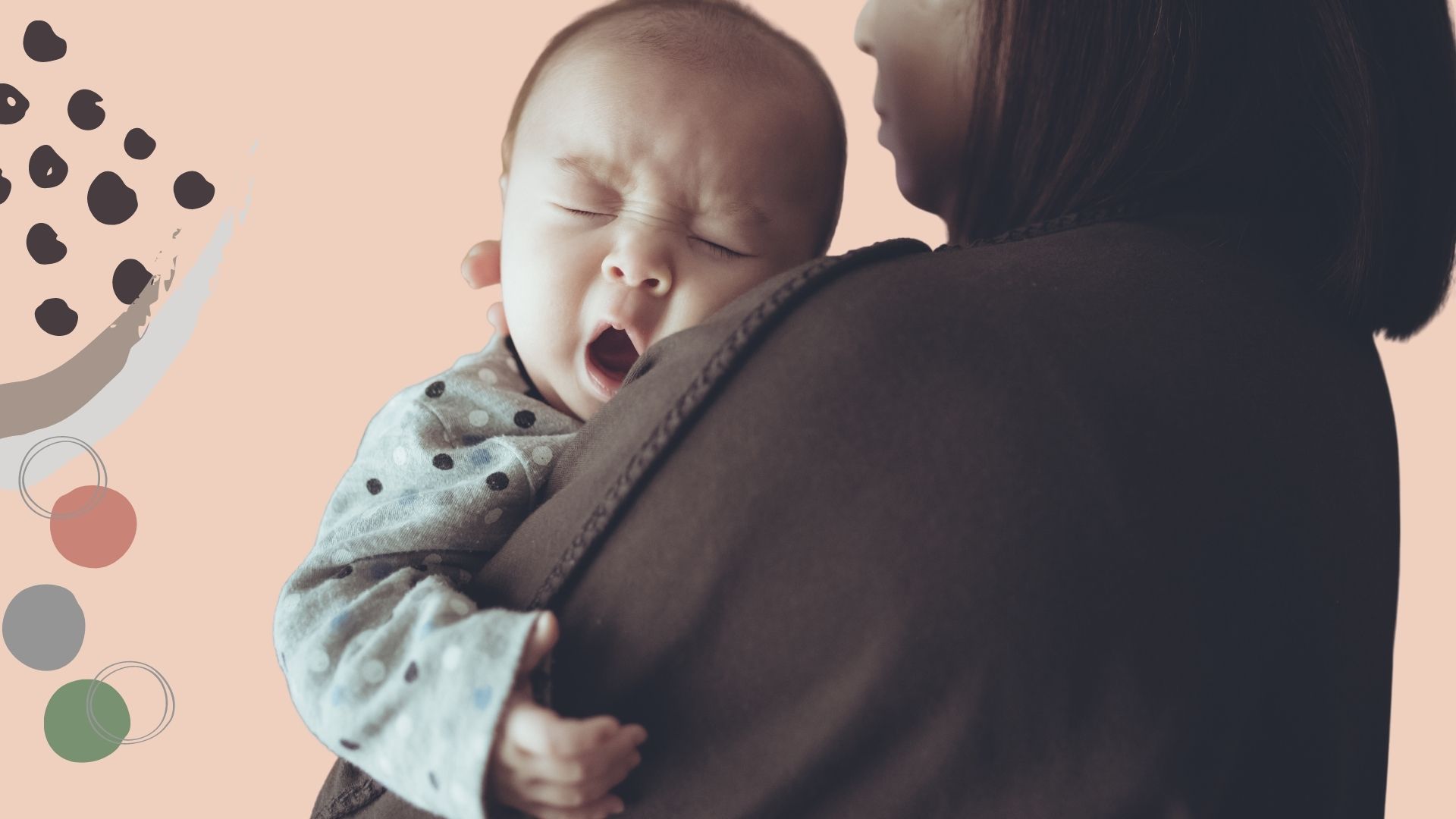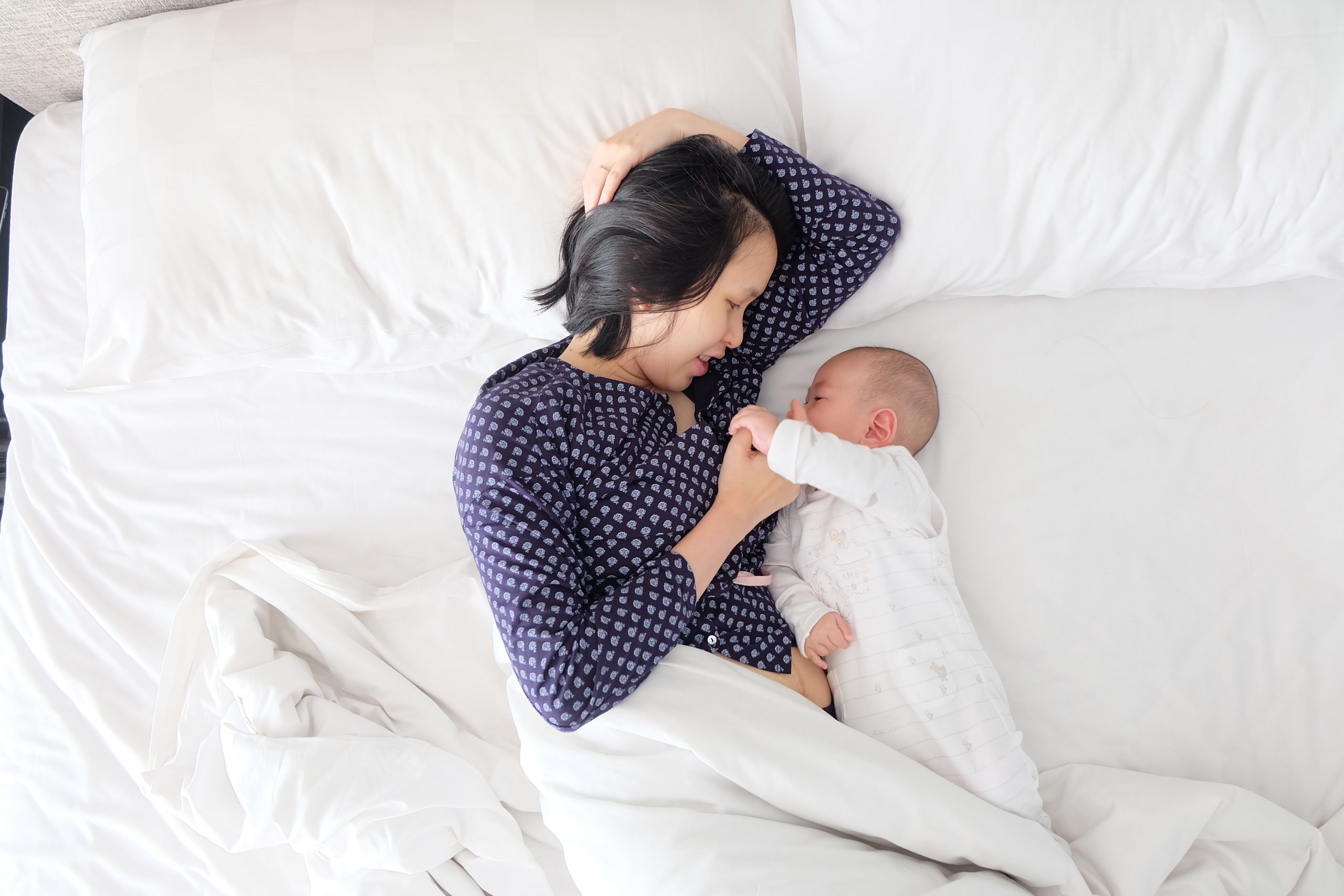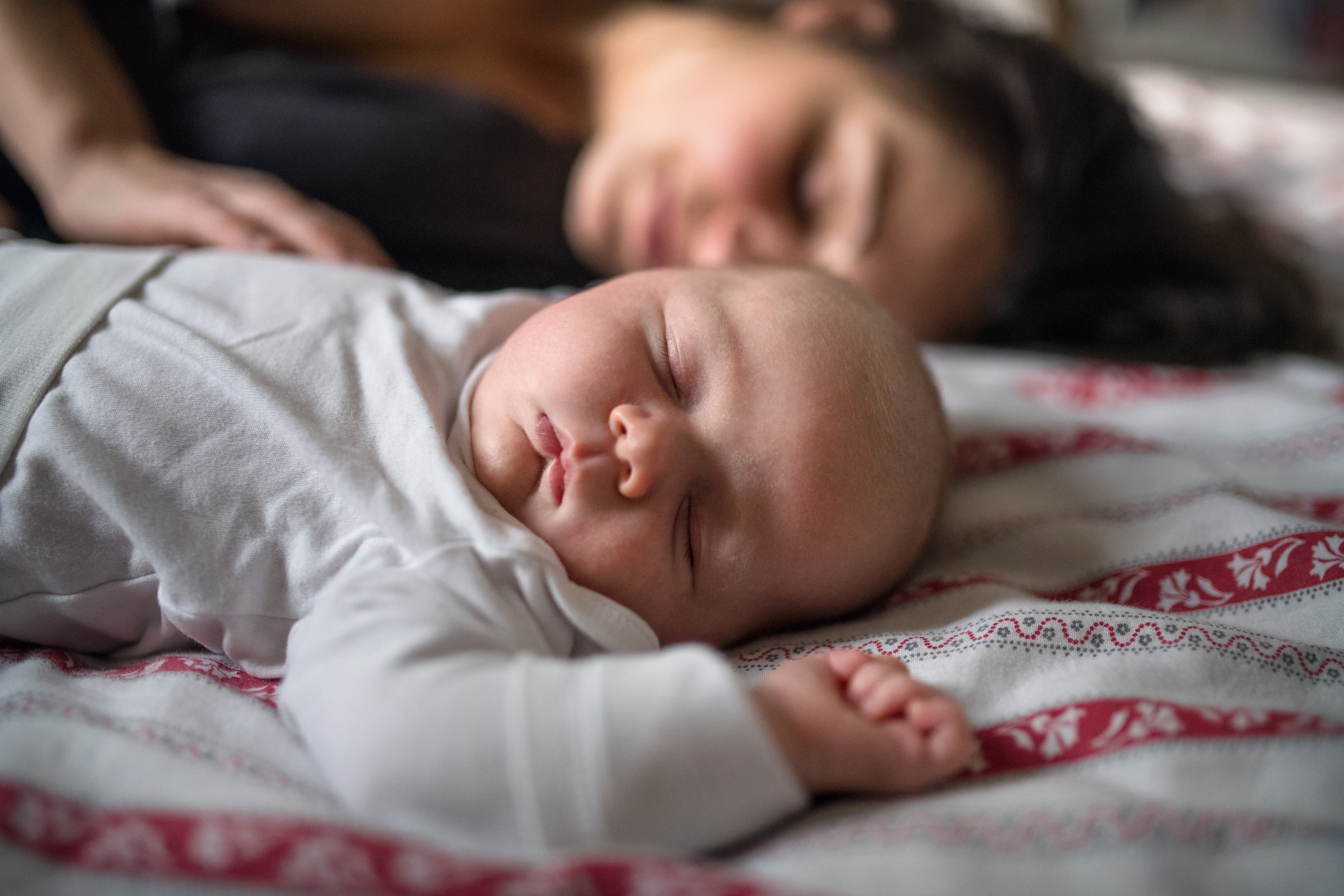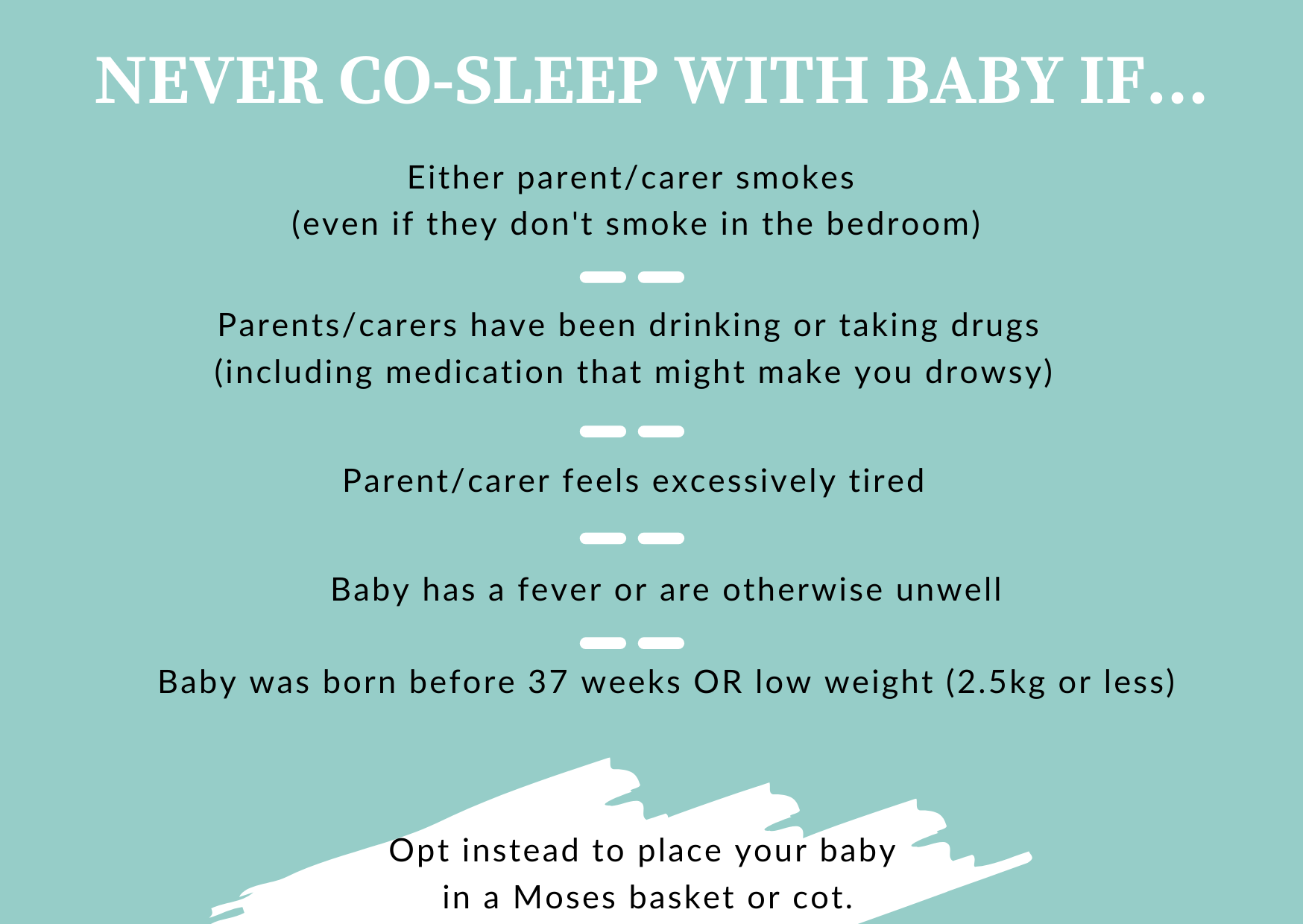Co-sleeping with your baby safely, the risks and benefits
Some people say co-sleeping is bad, some say co-sleeping is totally natural, here we explain the arguments for and against...

Co-sleeping can mean different things to different people. For some, it's sharing a room with your baby in a next-to-me cot. For others, it's having your baby in bed with you.
It can be a little confusing, so we chatted to Kate Holmes, Head of Support and Information at The Lullaby Trust who told us; 'The NICE guidance co-sleeping is referred to as sharing any surface with a baby. Bed-sharing is used specifically to refer to when a baby shares a bed with a parent/carer.' Which clears that up, nicely.
The co-sleeping method can be seen as a great way to lull your baby to sleep. And it can help you both to navigate the sleep regression ages. Deciding whether or not to co-sleep is a big decision. This is why it's important to gather all the knowledge, to empower you before deciding.
In this article, we talk to other mums and industry experts to get the information you need.
What is co-sleeping? Co-sleeping safely Co-sleeping with a newborn What are the benefits of co-sleeping? What are the risks of co-sleeping? When should you not co-sleep?
What is co-sleeping?
It’s when a parent/carer is sleeping on a shared surface – such as a bed – with their baby, according to the NICE guidance. It means that baby is in the same bed as an adult for most of the night, and not just short times for comfort or feeding, but throughout until morning.
While more parents around the world co-sleep with their baby than not, it doesn't mean that it's the right thing for you and your family. Research shows that for many mothers who breastfeed 'co-sleeping' is their chosen method. For some, it's a clear and researched choice, while for others it starts happening accidentally.
Parenting advice, hot topics, best buys and family finance tips delivered straight to your inbox.
Lucy Shrimpton, mum-of-two, sleep expert, and Founder of The Sleep Nanny, told us; "You do what's right for you. Half of my battle as a sleep expert is to empower parents to know their own mind and make the right decision for their baby, and their family. Sleep is not one size fits all approach."
And, while many parents may claim co-sleeping is natural and a comforting way to get your baby to sleep, others believe this method to be unsafe and not worth the SID risks.
"Parents choose co-sleeping with their baby for all sorts of reasons", says Melanie Every of The Royal College of Midwives. "Whether it's cultural, historical or for comfort in the middle of the night, particularly if breastfeeding."

She adds, "The sensible approach is to advise parents of the safest way and explain which conditions really are a total no-go." Either way the NHS guidelines are clear: for the first six months of your baby’s life, the safest place for him to sleep is in a cot, crib, or a Moses basket in the same room as you.
"I didn't choose the co-sleeping life, it chose me. I was just exhausted and my son would only settle if I was there. So I brought him in with me. It definitely worked for us, especially when sleep deprivation kicked in." - Mum-of-one, Anna J
Co-sleeping safely
The best way to co-sleep safely is to plan and prepare to do it. The most dangerous thing is to - in a fit of sleep deprivation at 2am - bring baby into your bed with nothing removed or no knowledge of the safest sleep pointers. Also, avoid co-sleeping on a sofa or in a chair with a baby as it increases the risks of SIDS by 50 times, according to the Lullaby Trust.
Our medical expert, NHS GP and lifestyle medicine expert, Sonal Shah shares the following tips if you're looking to try co-sleeping with your baby...
- Keep your baby away from the pillows.
- Make sure your baby can’t fall out of bed or become trapped between the mattress and wall.
- Pull sheets and blankets away from your baby to avoid them over-heating or covering their face and obstructing their breathing.
- A good tip is to try sleeping bags as an alternative to a blanket.
- Avoid letting pets or other children into the bed at the same time.
- Always put your baby to sleep on their back.
- Never sleep with your baby on a sofa.
The La Leche League, an American breastfeeding organisation, share a sing-along tune of helpful reminders if you choose to co-sleep - also known as bed share - with your baby.
(to the tune of “Row, Row, Row Your Boat”) No smoke, sober mum Baby at your breast Healthy baby on his back Keep him lightly dressed. Not too soft a bed Watch the cords and gaps Keep the covers off his head For your nights and naps.
In addition, if you choose to co-sleep or bed share with your child, Kate Holmes, Head of Support and Information at The Lullaby Trust warns, "Avoid letting pets or other children sleep in the bed alongside yourself and the baby. And always make sure that baby can’t fall out of bed or get trapped between the mattress and the wall. Also, make sure to follow all of the standard safer sleep advice such as sleeping baby on their back."
Lucy Shrimpton also told us; "There are lots of things to consider with safety and bed-sharing. Studies have shown that sleep deprivation - a common symptom for the average parent - means that if you drive it's like driving under the influence of drugs or alcohol. So it does make you wonder how safe bed-sharing with your child is when you're that tired. As it's something you can't really measure."
https://youtu.be/YFNTGXY8fCA
Co-sleeping with a newborn
The NHS recommends that for the first 6 months your baby sleeps in the same room as you when they're asleep, both day and night. Particularly in the early weeks. But of the (roughly) 700,000 babies born each year in England and Wales, half will have slept in their parents’ bed – with either one or both of their parents – by the time they’re three months old.
Reports show that many parents room share with their infant. In the early weeks, your baby should definitely be near you when they sleep. If you choose to bed share your baby should be in a clear sleep space. This looks like;
- Removing pillows, sheets, blankets - anything that could obstruct your baby’s breathing or cause them to overheat - from your baby's sleep area.
- Following The Lullaby Trust safer sleep advice to reduce the risk of SIDS such as sleeping baby on their back
- Not allowing pets or other children in the bed
- Ensuring baby won’t fall out of bed or get trapped between the mattress and the wall
Kate says, "Some parents choose to bed share with their babies. We know however that families also bed share accidentally, and so recommend making the bed a safer place for baby whether they doze off accidentally, or choose to bed share.
It is very much a personal choice. The Lullaby Trust advises parents/carers to read all the information on safer co-sleeping so they can make an informed decision. That way even if they decide not to co-sleep they can make their bed a safer place for their baby if they doze off accidentally.
No matter how tired I was I couldn't bring myself to have my daughter in bed with us. What if we rolled over?! - mum-of-two, Louise
What are the benefits of co-sleeping?
According to James McKenna, director of the Mother-Baby Behavioral Sleep Laboratory at the University of Notre Dame, co-sleeping is biologically appropriate. And the following are all benefits of co-sleeping;
- Can help with feeding
- Creates a strong bond between parent and baby
- Helps baby's body temperature to stabilise
- Close contact helps baby's to breathe more regularly
Author of The Science of Parenting, Margot Sunderland says, “When human babies are separated from their mum’s body, they cry. If they don’t get a response from her, they’ll be quiet. But this reaction is a survival technique, which is accompanied by fluctuations in breathing, temperature and heart rate.
Margot notes that the immune system is also lowered and the digestive tract doesn’t work properly. “As soon as we put the baby back in skin-to-skin contact with the mother, all those things stabilise and wonderful feel-good chemicals are activated.
“I’m trying to tell parents that they can make up their own minds about co-sleeping. They have a right to know what they’re doing to a child’s brain, that they’re either activating feel-good or stress chemicals.”
Margot believes that co-sleeping should take place from birth as long as all the safety measures are followed properly. “Some babies may require less co-sleeping, and others may need more, depending on their temperament and sensitivity.
“In the first five years of life, the separation distress system is very sensitive. But as children develop, some may feel secure aged 3, while others can still be in a state of alarm and screaming in distress at that age. This isn’t attention seeking; we know this is activating the pain system and separation distress alarm.
“If we keep alarming the baby, the brain becomes over-sensitive and hard-wired and this is linked to stress, anxiety and depression.”
Margot says that the emotional benefits for the mum mean the physical contact will activate oxytocin and opioids in her body and produce more breast milk. “She doesn’t have to get up every time her baby screams in the middle of the night; the baby reaches out and says, “Mum’s next to me. Phew, I’m safe.” The mother breastfeeds and the sleep cycle isn’t interrupted.
“We do need to think about logistics such as private space and a couple’s sex life. It’s a good idea to set up a romantic place to make love, but not in the bed. And if you don’t like your child kicking next to you, buy a king-size bed. You wouldn’t deprive children of nourishing fruit and veg, so why deprive them of this natural feel-good activating sleep?”
Margot has been a child psychotherapist for 20 years, as well as Director of Education and Training at London’s Centre for Child Mental Health and the author of several books on child mental health. Along with many others, she believes that putting a baby in bed with their parents from birth will help them grow into a calm, healthy adult. She says that separation from the parents is harmful, increasing stress hormones such as cortisol, which could cause depression later on.
What are the risks of co-sleeping?
Baby overheating, accidental smothering and studies an increased risk of Sudden Infant Death Syndrome(SIDS). Lucy warns, "Many studies show that driving with sleep deprivation from caring for a newborn baby has worse response rates compared to driving under the influence of drugs or alcohol. With that in mind, is bed sharing really safe at all?"
She goes on to add; "You might feel like you're okay like you're surviving. But in reality, where you're so tired, you don't really know what's going on. Sort of beneath the surface within the brain and body, it's hard to tell. I think it's really important that parents consider those factors too, the underlying ones, beyond the obvious factors of safety before making the decision to bed share."

Co-sleeping is very much a personal choice, says our medical expert Sonal Shah. "For some parents, it's a natural way to connect with their baby and get to know them better. It allows parents to easily reassure a baby, and for some make feeding easier." But Sonal warns that it can causes issues. As she says, "Having a baby sleeping in the same bed can impact on their ability to get a good night's sleep. It can also impact on relationships as well."
So, it's totally down to the parents' choice and whether they feel comfortable. Your health visitor or GP is the best person to talk to when it comes to weighing up the factors involved.
When should you not do co-sleeping?
Never co-sleep with baby if;
- Parents/carers have been drinking or taking drugs (including medication that might make you drowsy)
- Either parent smokes (even if it's not in the bedroom)
- Parent/carer feels excessively tired.
- Your baby has a fever or are otherwise unwell
- Your baby was born before 37 weeks OR was a low weight (less that 5.5lbs/2.5kg)
As tempting as it is to have your baby close to you, co-sleeping under these conditions can be seriously harmful. This is especially the case if your baby is sleeping in the same bed or space as you, rather than in a co-sleeping cot that is attached to the bed.

What age is co-sleeping safe?
While there is much debate over whether co-sleeping is actually safe, our experts says that as long as you provide the right environment, co-sleeping can be safe from birth.
But Sonal says there are some conditions to this. “It may not be safe however to sleep with premature babies (i.e those babies born before 37 weeks) or babies who were born with a low birth weight. It is also not safe to co-sleep with a baby if either parent smokes (even if they smoke outside of the bedroom) or if parents have consumed alcohol or drugs (even if this is prescription medication that makes them drowsy).”
If you are unsure whether co-sleeping is safe for you discuss this with your GP, midwife or health visitor.
How long should you co-sleep for?
Much like co-sleeping itself, there is no agreed guidelines for how long parents should co-sleep for. "It is very much dependent on an individual's circumstances." Sonal advises, "Generally after 6-12 months, many parents move their child to their own cot, and even into their own room."
Does co-sleeping cause sleep problems?
For the most part, co-sleeping won't cause too many sleeping problems for the baby as they'll (hopefully) be sound asleep. But Sonal says, it might be a different situation for the parents. "For some parents having a child next time can impact on the quantity and quality of their sleep and cause increased daytime sleepiness."
Lucy agrees, "I don't tend to hear much from parents who co-sleep as they're doing that works for them and their child is usually sleeping... it's when they want to start weaning their child off of the co-sleeping that I step in to help."
What about Sudden Infant Death Syndrome (SIDS)?
Sudden Infant Death Syndrome is a risk factor in co-sleeping. Kate explains, "Unfortunately, we don’t know what causes SIDS. For many babies it is likely that a combination of factors affecting them at a vulnerable stage of their development, which leads them to die suddenly and unexpectedly.
"However, we do know you can significantly reduce the chance of SIDS occurring by following safer sleep advice. This includes always placing baby on their back to sleep on a firm, flat and waterproof mattress."
For a while it's been known that co-sleeping can lead to many of the conditions linked with Sudden Infant Death Syndrome. Such as over-heating, suffocation from duvets and pillows, and being close to parents who drink and smoke.
Kate adds that this is why removing blankets from your baby's sleep area is especially important. "A high proportion of infants who die as a result of SIDS are found with their head covered by loose bedding."
What about using a co-sleeping cot?
There are a number of co-sleeping cots on the market, which attach to your existing bed, so you can sleep side-by-side with the baby. However, some current advice on what are also called bed nests or pods seems to caution against their use.
The Lullaby Trust – which raises awareness of SIDS – brings the importance of baby bed safety to our attention. The Trust does not recommend 'that babies sleep on soft surfaces such as pods or nests'. And instead if parents do choose to co-sleep 'the safest place is a clear space on a firm flat mattress the same as we would advise with a cot'. As with any other cot, it's important to ensure that your cot meets the British Standards.
Video of the Week
Stephanie has been a journalist since 2008, she is a true dynamo in the world of women's lifestyle and family content. From child development and psychology to delicious recipes, interior inspiration, and fun-packed kids' activities, she covers it all with flair. Whether it's the emotional journey of matrescence, the mental juggling act of being the default parent, or breaking the cycle of parenting patterns, Stephanie knows it inside out backed by her studies in child psychology. Stephanie lives in Kent with her husband and son, Ted. Just keeping on top of school emails/fundraisers/non-uniform days/packed lunches is her second full-time job.